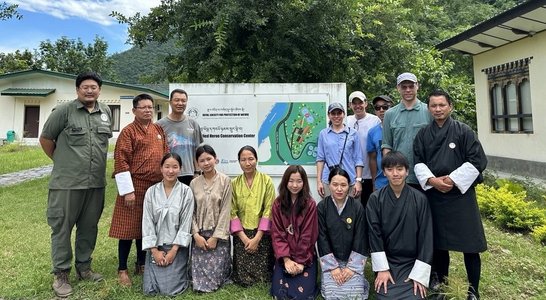Enhancing Biodiversity Protection and Building Capacity for Cooperative Research in Bhutan to Address Sustainable Development Goal 15 | EPiC

Cooperating countries: Bhutan, Austria
Coordinating institution: Natural History Museum Vienna
Project coordinator: Priv.-Doz. Dr. Swen Renner
Partner institutions: Royal Society for the Protection of Nature, Ugyen Wangchuck Institute for Forestry Research and Training (UWIForT), University of Natural Resources and Life Sciences, Vienna
Project duration: 01.07.2024 - 30.06.2027
Budget: 48.430,00 €
Project summary
This project investigates the complex relationship between forest management, avian biodiversity, and wildlife health in Bhutan, with a particular focus on the prevalence of avian malaria in the bird community of the habitat of the critically endangered White-bellied Heron. The initiative aligns with Sustainable Development Goal 15, aiming to protect, restore, and promote sustainable use of terrestrial ecosystems, combat deforestation, and halt land degradation and biodiversity loss.
Utilizing state-of-the-art geographic information systems (GIS) and remote sensing technologies, the project will map forest cover and types, assess changes, and correlate these with biodiversity metrics and the health of avian species. Special attention will be given to the known and assumed breeding habitats of White-bellied Heron environment as an indicator of ecosystem integrity. Concurrently, the study will examine the impact of forest degradation on the prevalence of avian malaria, providing insights into the interdependencies between habitat quality and disease dynamics in bird populations.
Capacity building constitutes a significant component of the project, with dedicated work packages aimed at enhancing the skills of Bhutanese researchers in ecological monitoring and conservation strategies. This will ensure the sustainability of research efforts and foster local expertise.
The expected outcomes include detailed habitat maps, comprehensive data on bird diversity and health, and strategic recommendations for forest conservation. These outputs will be disseminated through scientific publications, policy briefs, and community engagement initiatives. Ultimately, the project will contribute to the conservation of the White-bellied Heron habitat, inform sustainable forest management practices, and enhance our understanding of the implications of habitat changes on disease ecology and biodiversity.

